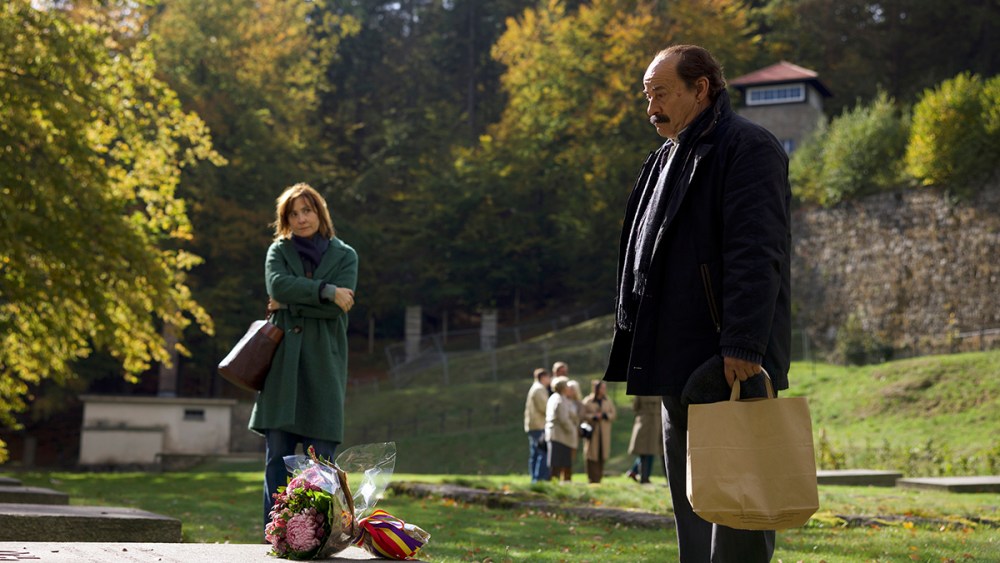Basque Filmmakers’ Take on Enric Marco’s Deception Builds Fest Buzz
It’s been a good week for Basque directors Jon Garaño and Aitor Arregi, who, along with Jose Mari Goenaga, world premiered “Marco” at Venice and landed a spot on the shortlist for Spain’s Oscar entry.
Sold by Film Factory Entertainment, with market screenings in Toronto and upcoming stops at San Sebastian, London and Vancouver, “Marco” is generating significant buzz. Based on real events, it centers on Enric Marco, an imposter who gained sympathy, fame, and respect by falsely claiming to be a concentration camp survivor while serving as chairman of the leading Spanish association for deportees. His story was a lie.
The filmmakers initially aimed to capture Marco’s downfall as a documentary, but like everything he touched, truth slipped away. He told them he was going to Germany to get papers from a prison he’d stayed in. The filmmakers wanted to accompany and capture key footage. “He told us ‘no,’ because it was too personal for him, too intimate.” Jon Garaño recalls. “We understood it. But when he came back, it became apparent he had gone with other filmmakers who did a film. That was a shock for us.” He’d been playing them along.
The lie Marco lived was exposed in 2005 by historian Benito Bermejo, but the vacuum he left – never fully explaining himself, never quite apologizing – became fertile ground for a story that refuses to be simple. “It took us a lot of time to realize that maybe the best option was to make a fiction film,” says Garaño. “The movie is about how you represent reality and fiction, and how everything can be mixed. This idea of the truth is in danger because people can mix things and make you believe something that isn’t really true.”
Entwining reality and fiction, the film intersperses documentary footage, capturing the mood of the time. The lead role is a challenging gift for multi-prized actor Eduard Fernández (“Smoke & Mirrors,” “While at War,” “Smoking Room”), who takes the essence of a man with opaque motivations and conjures a beguiling character, driven by a pathological need for attention.
“The real Marco was a very enigmatic character. He was very seductive and a great storyteller, but at the same time, talking to him was strange because you knew he had lied about such an important issue. Eduard Fernández nailed the character by not just imitating him but creating our own take. It was crucial because we are telling our story about Marco,” says Arregi.
The directors manifest the building of a lie into their filmmaking approach: “We blend different formats to remind the audience that they’re watching a film, a construction. This manipulation is present in every film, whether it’s a documentary or fiction, and we wanted to play with that idea explicitly,” Garaño explained.
The ambiguity of his true motives leaves room to ask ourselves a question: ‘Why do we lie?’ “Marco would often defend himself by saying, ‘I’m a liar, but who isn’t?’ And he’s right to some extent. Everyone tries to sell their best version of themselves, and filmmaking is also a kind of manipulation. We wanted to show this, by mixing different formats and blurring the lines between fiction and documentary.” says Garaño.
With previous successes like “Giant,” “Flowers,” and “The Endless Trench,” the trio has perfected a collaborative style that ironically relies on mutual trust. “We have this strange way of working that allows us to rotate and support each other. Being three directors means we can push forward even when one of us is tired. It’s not without its challenges – we quarrel and discuss a lot – but it also means there’s always someone ready to take the lead when needed,” says Arregi.
The film was produced by Spain’s Irusoin, Moriarti Produkzioak, Atresmedia Cine and La Verdad Inventada AIE.


